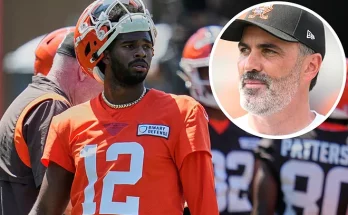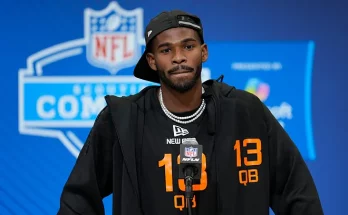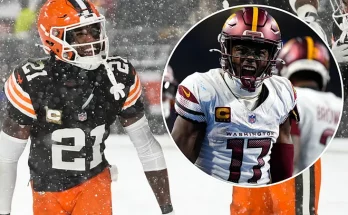When you play the quarterback position, controversy tends to follow. But Cam Ward, the new face of the Miami Hurricanes, found a way to stir the pot without even stepping onto the field. In a recent interview with a popular college football podcast, Ward unveiled his personal Mount Rushmore of Miami Hurricanes football legends—and it sent shockwaves through the fanbase and former players alike.
Ward, who transferred to Miami from Washington State with sky-high expectations, has been praised for his leadership, arm talent, and football IQ. But even the most supportive ‘Canes fans found themselves doing double takes when the quarterback rattled off his list. Some called it bold. Others called it disrespectful. Everyone, though, had something to say.
So who made Ward’s Mount Rushmore?
“Give me Sean Taylor, Ed Reed, Michael Irvin, and D’Eriq King,” Ward said without hesitation. And just like that, a firestorm erupted.
To be clear, all four players are Miami legends in their own right. Sean Taylor remains one of the most beloved figures in program history—a violent, instinctive safety whose life and career were tragically cut short. Ed Reed is not only a College Football Hall of Famer and Pro Football Hall of Famer, but also arguably the greatest safety in the history of the game. Michael Irvin? A cornerstone of the Miami dynasty, a three-time Super Bowl champion with the Cowboys, and a symbol of the swagger that defined the ‘U’.
But D’Eriq King?
That was the name that raised the most eyebrows. King, who transferred to Miami from Houston in 2020, had a short but impactful run with the Hurricanes. His leadership was invaluable during a time of transition. He helped stabilize the quarterback position. But he wasn’t a national champion. He wasn’t a Heisman finalist. And statistically, he doesn’t crack the top tier of Miami passers. To include him over names like Vinny Testaverde, Gino Torretta, Ken Dorsey, Clinton Portis, Warren Sapp, Ray Lewis, Jonathan Vilma, or Frank Gore? That’s not just a hot take—it’s a scorcher.
The reaction was immediate and visceral.
Former Hurricanes linebacker Jon Beason took to social media: “Cam’s my guy, and I respect the confidence. But you gotta know the history before you speak on it. D’Eriq was a warrior, no doubt. But he ain’t Mount Rushmore.”
Even Hurricanes fans—who desperately want to believe Ward is the guy to finally bring The U back—expressed confusion. The general sentiment wasn’t anger, just disbelief. In the grand cathedral of Miami football, where greatness is measured in rings and dominance, omitting players like Lewis or Sapp felt almost sacrilegious.
But Ward doubled down.
In a follow-up interview two days later, he explained his rationale: “Look, I respect all those legends. I’ve watched the clips. I know what they did. But I’m talking about who inspired me. Sean and Ed—that’s obvious. Michael Irvin changed the culture of the game. And D’Eriq? He was the reason I believed Miami could be special again. He didn’t have the numbers or the titles, but he had the heart. Sometimes heart matters more.”
It was a heartfelt response, and to his credit, Ward didn’t backtrack. He acknowledged that others might have different lists and that there’s no “wrong” answer. Still, in a city like Miami, where history runs deep and the ghosts of glory past loom large, saying the quiet part out loud can be risky.
For some fans, it evoked painful memories of recent mediocrity. The ‘Canes haven’t won double-digit games in a season since 2017. They haven’t been nationally relevant in the College Football Playoff era. So when a new quarterback—still untested in orange and green—dismisses the giants of yesteryear in favor of a modern figure, it touches a nerve. Nostalgia is a powerful thing. It’s also a fragile thing.
But others defended Ward.
A younger generation of fans, particularly those who came of age during the 2010s and beyond, resonated with his perspective. For them, King might very well be one of the most impactful Hurricanes they’ve seen in their lifetime. He was a leader during COVID. He played through pain. He made Miami games exciting again, if only briefly. And maybe that counts for something, even if it doesn’t fit neatly into the traditional boxes of greatness.
Even King himself responded on X (formerly Twitter) with humility: “Appreciate the love @CamWard1. All respect to the GOATs who paved the way. I just tried to give my all every time I suited up. ”
That moment—brief, but sincere—seemed to ease the tension. It reminded fans that greatness isn’t always measured in trophies. Sometimes, it’s about impact. Influence. Emotion. That doesn’t mean King belongs on the same pedestal as Reed or Taylor, but it does open the door to a broader conversation about legacy.
And that, perhaps, is the real value of Ward’s controversial take.
Because if nothing else, it reignited passion. It made people talk about Miami football again, not just as a relic of the past but as something living, evolving. The program is trying desperately to bridge the gap between its championship heritage and a modern identity. That journey is complicated, messy, and at times painful. But it’s also necessary.
Ward didn’t just throw out a list. He threw out a challenge.
Who do you think belongs on the Mount Rushmore of Miami football?
Do you go with the hardware? Torretta won the Heisman. Testaverde did too. Dorsey won more games than any other Miami quarterback. Or do you go with the fear factor? Ray Lewis made offenses tremble. Warren Sapp terrorized quarterbacks. Willis McGahee, despite a devastating injury, was a game-breaker. Andre Johnson? One of the best receivers of his generation. Devin Hester? Possibly the greatest return man in NFL history.
There are too many legends and too few spots. That’s the beauty—and the burden—of Miami football. The Mount Rushmore isn’t just hard to build. It’s impossible to agree on.
And maybe Ward knew that all along.
Maybe he understood that throwing D’Eriq King’s name into the mix wouldn’t just spark debate—it would spotlight the emotional complexity of being a Hurricane. That it’s not just about stats and rings, but about connection, struggle, redemption. Maybe Ward wasn’t trying to disrespect the past. Maybe he was trying to honor a different kind of greatness—one forged not in title games, but in trenches of turmoil.
Of course, that won’t stop the barbershop arguments or the group chats from lighting up. That’s part of the fun. It’s part of the culture.
And at the very least, it shows Ward isn’t afraid of the spotlight. He’s not afraid of speaking his mind. That’s a trait the great ones tend to share.
Whether or not he’ll earn his own place in the pantheon remains to be seen. But one thing is clear—Cam Ward is already shaping the conversation in Coral Gables.
In a town that lives and breathes football, that’s half the battle.
He’s not the first to stir controversy at quarterback. He won’t be the last. But if he can back it up on the field—if he can lead the Hurricanes to the kind of success that makes debates like this feel secondary—he might just carve his own face into the rock.
Until then, the conversation continues. And that, perhaps, is the most Miami thing of all.



